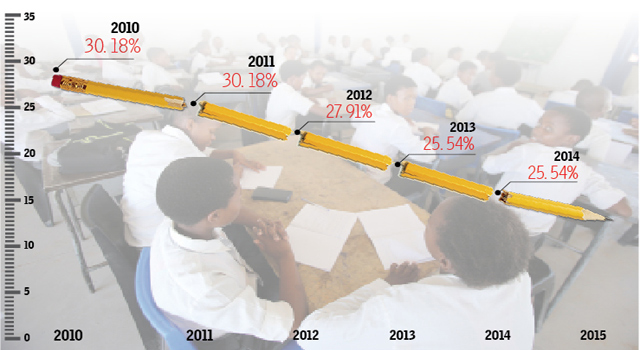LAWRENCE SERETSE
Investigations into the 2012 junior certificate examinations scandal have revealed how an IT company scammed Botswana Examination Council (BEC) into launching an examination processing system prematurely that resulted in mass failures with over a P100 million spent on the project.
Known as MALEPA, the application is part of the Botswana National Examination Processing System (BNEPS) , a complete web based examination system which was meant to transform the examination process and make it more efficient and highly secure as part of the larger National e-Government Strategy.
Information gathered by The Botswana Gazette can confirm that BEC squandered an P111 millions of taxpayer’s money on the MALEPA application that collapsed and failed to function upon first flight leaving faulty exam results in 2012.
Information gathered confirms that the project’s costs were escalated more than twice at the BEC Council’s approval, with more than P42 million spent on the project application design alone while at the same time breaching BEC policies and the PPADB Acts on procurement regulations.
PPADB approves that if projects were to increase in costs it has to be within a 15% threshold but in this case the MALEPA project costs swelled “from a 30% to at least 1000% if you include building the data centre, hardware and implementation since there was no cap on project costs,” a source had exclaimed.
IT consultants RPC Data Ltd clinched the tender at P11.5 million and then settled for P13, 830 170.00 with BEC after negotiating for an increase.
Information seen further reveals that the project costs were then increased from P13, 830 170.00 to 19,593,518.09 as payment for the design, supply and implementation at the first stage. BEC kept requesting for more funds from the Ministry of Education and Skills Development for the project and as it stands over P42 million was spent on those stages.
Reports seen suggest that a further P5 million was paid as consultancy fees to RPC Data Project Manager whose charges were P140 thousand every month for three years. BEC also paid the Project Manager P284 thousand as Application support fees, which was never carried out, information seen has revealed.
By the time the ministry’s investigations commenced most of these transactions had taken place, the application had failed to function and the Ministry was complaining of the funds extended to BEC for such a non-functional application.
Following the astronomical spending, the MALEPA application dismally failed to neither perform nor take off as was expected during the 2012 examinations.
The application designed for BEC by RPC Data was said to be highly unsecured, easy to breach, manipulate and steal data from, according to documents seen.
Due to poor programming, the application is said to have miscalculated grades and missed critical data leading to students’ data appearing disorganized, inaccurate, duplicated and incorrect.
Despite this, The Director for Product Development and Standards Susan Makgothi told this publication last week that the application is now fully functional and has been deployed successfully on all the 2014 examinations. She also said that the 2013 primary school leaving examinations were conducted using the MALEPA application citing that the project did finally take off.
However, in 2012 a generally low pass rate was recorded nationwide. The results came very late and their credibility remained in the spotlight.
Subsequent to these discoveries, sources say, Dr Serara Moahi lost her Executive Secretary position at BEC as she was suspended in May 2013 to pave way for an audit. It has never been clear whether she was implicated in the mess or removed from the BEC Council for failing her oversight role.
Insiders have confirmed that there was indeed an audit committee at the time and that the financial reporting and accounting of the BNEPS project had been very opaque and irregular.
The BEC Executive Secretary Professor Brian Mokopakgosi had confirmed to this reporter that there was a committee set to investigate these issues while confirming that the application has been completed and ready to be deployed again.
Conflict of Interest
The Botswana Gazette has also established that the 2012 examinations were based on a syllabus that some schools had never seen and teachers subsequently failed to implement it hence the poor exam results.
Information gathered alleges that the then Executive Secretary Dr Serara Moahi, who has since left BEC, engaged RPC Data to draw the Invitation to Tender (ITT) for the project. It is further alleged that the same company’s Managing Director was also contracted as the Project Manager for BEC and then became part of the tender evaluation team that assessed the bids.
Besides the Project Manager’s long-standing history with RPC Data as Director and unethical conditions surrounding his engagement BEC went ahead with the project only relying on Project Manager’s advice and expertise without engaging an independent advisor resulting in conflict of interest.
BEC did not respond to questions sent three months ago as to why they also engaged in negotiations with RPC before awarding the job. This is a direct contravening of the PPADB Acts 42:08
Sections 1 on negotiations.
Furthermore, the MALEPA project’s completion date was set at August 2012 but when this failed, an attempt to cover this up was devised and the project was deployed prematurely, this publication has learnt.

